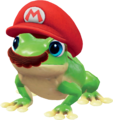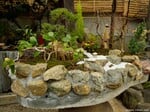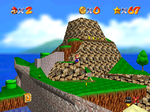User:Nintendo101: Difference between revisions
Nintendo101 (talk | contribs) m (→Setting) |
Nintendo101 (talk | contribs) |
||
| Line 28: | Line 28: | ||
===Courses=== | ===Courses=== | ||
*Most courses are accessed through paintings that are found throughout the castle - {{wp|chronotope}} | *Most courses are accessed through paintings that are found throughout the castle - {{wp|chronotope}} | ||
*Prior games had world maps - this was the first to depart from that set up to 1.) to would be due technically challenging to develop a 3D space with conventional worlds. 2.) the hub allows a space with no objectives where the player can familiarize themselves with Mario's complex control scheme, learn to have fun with it | *Prior games had world maps - this was the first to depart from that set up to 1.) to would be due technically challenging to develop a 3D space with conventional worlds. 2.) the hub allows a space with no objectives where the player can familiarize themselves with Mario's complex control scheme, learn to have fun with it | ||
*The arrangement where several levels are accessed from a hub would become the standard for the next few 3D Mario games as well as typify the genre | *The arrangement where several levels are accessed from a hub would become the standard for the next few 3D Mario games as well as typify the genre | ||
The player usually completes a level when they collect a [[Power Star]], a token resembling the [[Super Star]] [[List of power-ups|power-up]] of prior entries. It is framed as an energy source that powers the castle. In the normal courses, multiple Power Stars often appear and making contact with any of them completes the level and adds it to the player's total, something the game tracks and communicates to the player on the {{wp|user interface}} in the upper right corner of the screen. Accumulating Power Stars progressively grants Mario access to new courses. The amount of Stars required is communicated on [[★ door]]s that seal off rooms containing paintings. The amount of Stars required to open a ★ door increases the higher Mario is in the castle. There are only two instances where touching a Power Star does not complete the course: in Bowser and Cap Switch courses, where the intended | |||
There are three different types of levels: | |||
*"'''Normal courses'''" that contain six dedicated missions and a 100-coin mission. Most of the dedicated missions build off of each other environmentally or narratively. (i.e. The events that occur in one mission foreshadow the events of the subsequent mission.) However, Power Stars can sometimes be collected. There are 15 in the game. | |||
*"'''Bowser courses'''" are obstacle courses that do not end with the collection of a Power Star and mark the end of a floor. Two end in a key, the final one in a. There are 3. | |||
*'''Secret Courses''' that are hidden throughout the castle | |||
*"'''Cap Switch courses'''" an analog to the [[Switch Palace]]s from ''[[Super Mario World]]''. There are 3. | |||
----- | ----- | ||
Though NPCs have been an element of the ''Super Mario'' series since the [[Super Mario Bros.#Supporting characters|first game]] and some appear within levels in ''[[Super Mario Land 2: 6 Golden Coins]]'' ([[List of games by date#1992|1992]]), ''Super Mario 64'' is the first entry in the series to feature NPCs that can be spoken to and are framed as having | Though NPCs have been an element of the ''Super Mario'' series since the [[Super Mario Bros.#Supporting characters|first game]] and some appear within levels in ''[[Super Mario Land 2: 6 Golden Coins]]'' ([[List of games by date#1992|1992]]), ''Super Mario 64'' is the first entry in the series to feature NPCs that can be spoken to and are framed as having realized lives within the courses themselves. | ||
<center> | <center> | ||
| Line 118: | Line 124: | ||
|- | |- | ||
|colspan="3"align=center|A winding path in a cavernous void. The path bears [[Amp]]s and shifting platforms. It ultimately leads to [[Bowser]], who is fought on a circular platform surrounded by floating [[Mine|bombs]].<br>'''Unlock criterion''': collect 8 Power Stars | |colspan="3"align=center|A winding path in a cavernous void. The path bears [[Amp]]s and shifting platforms. It ultimately leads to [[Bowser]], who is fought on a circular platform surrounded by floating [[Mine|bombs]].<br>'''Unlock criterion''': collect 8 Power Stars | ||
|- | |||
!style="background:#C3E12B"|[[The Princess's Secret Slide]]<br>[[File:SM64 Asset Sprite Door Star.png|15px|Total number of obtainable Power Stars.]]×1 | |||
!colspan="2"style="background:#C3E12B"|Missions | |||
|- | |||
|align=center style="background:#FFFFFF"|[[File:SM64 Screenshot The Princess's Secret Slide.png|x100px]] | |||
|[[File:Star SM64.png|14px|Power Star]] The Princess's Secret Star | |||
|[[File:Star SM64.png|14px|Power Star]] Second Star | |||
|- | |||
|colspan="3"align=center|A carpeted [[Slide (Super Mario 64)|slide]] hidden on the mezzanine. Reaching the bottom of the slide gives Mario access to a Power Star - the first Secret Star available to the player. Reaching the bottom within 21 seconds awards him with a second one.<br>'''Unlock criterion''': collect a Power Star | |||
|- | |- | ||
!style="background:#C3E12B"|[[The Secret Aquarium]]<br>[[File:SM64 Asset Sprite Door Star.png|15px|Total number of obtainable Power Stars.]]×1 | !style="background:#C3E12B"|[[The Secret Aquarium]]<br>[[File:SM64 Asset Sprite Door Star.png|15px|Total number of obtainable Power Stars.]]×1 | ||
| Line 389: | Line 404: | ||
===Mushroom Castle=== | ===Mushroom Castle=== | ||
* Offers a space for the player to familiarize themselves with controls; devs noted it was important to make Mario fun to simply move around, so having a space for the player to make their own fun was important | |||
==Notes and references== | ==Notes and references== | ||
Revision as of 13:12, July 10, 2023
Casual Nintendo historian. Otherwise an artist and a field ecologist. Bio degree. I've had an account here since 2012.
I wrote the character sections for Super Mario 64, Super Mario Galaxy 2, and Super Mario Odyssey. I contributed much of the article for Super Mario Galaxy and Super Mario Sunshine.
I have been a fan of Nintendo since a very young age. My first Mario games (and three of the first video games I ever owned) were Super Mario World: Super Mario Advance 2, Super Mario 64 DS, and Mario Kart DS. These games were good company for a young kid who moved around a lot and had difficulty keeping long-lasting friends.
During the COVID-19 pandemic, I sequentially played some of my favorite games in the Super Mario series to 100% completion. This includes, in order, Super Mario Bros., Super Mario Bros. 2, Super Mario Bros. 3, Super Mario World, Super Mario World 2: Yoshi's Island, Super Mario 64, Super Mario Sunshine, Super Mario Galaxy, Super Mario Galaxy 2, Captain Toad: Treasure Tracker, and Super Mario Odyssey. It's been really fun! These are great games, and I always wanted to marathon a series like this before but never had the time. It has been interesting to see where the series began and where it has ended up. The design philosophies, the characters, the art directions, world building, level design, narrative, etc. All good stuff. It might be fun to write something about it some day.
My favorite video game character is Yoshi.
Sandbox for current project
Setting
Super Mario 64 takes place within the walls of Princess Peach's castle in the Mushroom Kingdom. It is the first Super Mario game to explicitly include the Mushroom Kingdom as a location since Super Mario Bros. 3 (1988). The game's levels – called courses – are not naturally-occurring places on Mario's world. They were created by Bowser using the Power Stars he stole from Peach. Most of them are accessed through paintings that hang in the castle's walls, but some are more cryptically hidden or require the player to accomplish a task in the castle before becoming accessible. Some paratextual material and subsequent titles present the courses introduced in this game as real, visitable places outside of the paintings.
Generally, a course is a sprawling location with interactive environmental elements and several levels of elevation. Course often have subareas and collectibles obscured in the landscape that passively encourage the player to explore and rotate the camera. Most courses feature prominent landmarks, such as the mountain in Bob-omb Battlefield or the volcano in Lethal Lava Land, that provides the player with a consistent point of reference that mitigates the chance of getting lost.[1] Like its more immediate predecessors, courses are themed after real-life ecosystems (i.e. deserts, mountains, coastlines) and more fantastical settings (i.e. a haunted house, clockworks, rainbow roads in the sky). The theme informs the type of objects that can be interacted with in the level, the types of enemies that can be encountered, and the non-playable characters that can be spoken to. For example, cactus enemies, a condor, and quicksand are in the desert-themed Shifting Sand Land. Penguins, slippery ice, and deep snow appear in Cool, Cool Mountain and Snowman's Land. Most courses contain switches and strikable objects that modify elements of the course, such as Crystal Taps in Wet-Dry World.
Unlike the levels of prior two-dimensional entries, the courses in this game are open-ended and mostly do not narrow the player's focus towards one goal. This was an intentional departure from the level design principals of prior games because the development team did not believe they could be replicated for a fun experience in a three-dimensional environment. Director and series creator Shigeru Miyamoto wanted Super Mario 64 to be a game where players "create their own vision", a decision partially influenced by the technical difficulty of making a precise jump in a 3D environment.[2][3][1] This mindset manifested in levels where players were largely free to interact with the world in ways they wanted to, with larger platforms and sprawling spaces that encouraged exploration rather than carryout precise actions to reach a goal. The courses themselves were created using hakoniwa or "box garden" design principals.[4][3][note 1][1][5] A hakoniwa is a carefully-arranged miniature garden within an enclosed space, with layers of depth and detail that become apparent to an onlooker when examined for a long period of time.[6][5] Applying these principals allowed the development team to create intricate levels that surprised players, another important tenet during development.[2][3][1] In the West, where creating miniature gardens is not as culturally prevalent, these types of levels are most often likened to sandboxes.[5]
Courses
- Most courses are accessed through paintings that are found throughout the castle - chronotope
- Prior games had world maps - this was the first to depart from that set up to 1.) to would be due technically challenging to develop a 3D space with conventional worlds. 2.) the hub allows a space with no objectives where the player can familiarize themselves with Mario's complex control scheme, learn to have fun with it
- The arrangement where several levels are accessed from a hub would become the standard for the next few 3D Mario games as well as typify the genre
The player usually completes a level when they collect a Power Star, a token resembling the Super Star power-up of prior entries. It is framed as an energy source that powers the castle. In the normal courses, multiple Power Stars often appear and making contact with any of them completes the level and adds it to the player's total, something the game tracks and communicates to the player on the user interface in the upper right corner of the screen. Accumulating Power Stars progressively grants Mario access to new courses. The amount of Stars required is communicated on ★ doors that seal off rooms containing paintings. The amount of Stars required to open a ★ door increases the higher Mario is in the castle. There are only two instances where touching a Power Star does not complete the course: in Bowser and Cap Switch courses, where the intended
There are three different types of levels:
- "Normal courses" that contain six dedicated missions and a 100-coin mission. Most of the dedicated missions build off of each other environmentally or narratively. (i.e. The events that occur in one mission foreshadow the events of the subsequent mission.) However, Power Stars can sometimes be collected. There are 15 in the game.
- "Bowser courses" are obstacle courses that do not end with the collection of a Power Star and mark the end of a floor. Two end in a key, the final one in a. There are 3.
- Secret Courses that are hidden throughout the castle
- "Cap Switch courses" an analog to the Switch Palaces from Super Mario World. There are 3.
Though NPCs have been an element of the Super Mario series since the first game and some appear within levels in Super Mario Land 2: 6 Golden Coins (1992), Super Mario 64 is the first entry in the series to feature NPCs that can be spoken to and are framed as having realized lives within the courses themselves.
| Courses | ||
|---|---|---|
| First Floor and Mezzanine | ||
| 01. Bob-omb Battlefield |
Missions | |
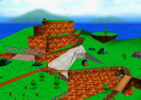
|
||
| Grassy fields surrounding a spiraled mountain. A battle is waged here between the peaceful Bob-omb Buddies and the enemy Bob-ombs. Once the battle is over, the Bob-omb Buddies allow Mario to access their cannons. There is a floating island in the east, and a barred cave towards the center with a Chain Chomp leashed in front of it. Unlock criterion: enter Mushroom Castle | ||
| 02. Whomp's Fortress |
Missions | |
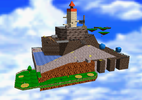
|
||
| A fortress in the sky. It is ruled by a Big Whomp who sits at the top of the fortress. The path leading to him has falling platforms and stone enemies. Once defeated, a climbable spire appears at the top. A chain of floating islands are in the northeast. They can we reached with the help of Hoot, a sleepy owl found in the course's single tree. Unlock criterion: collect a Power Star | ||
| 03. Jolly Roger Bay |
Missions | |
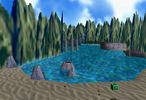
|
||
| A cove containing the wreck of a sunken ship. A giant moray eel nests in the ship and stirs when approached. An underwater corridor in the northwest leads to a cave that holds treasure chests. Solving the puzzle of the chests reveals a Power Star. Unlock criterion: collect 3 Power Stars | ||
| 04. Cool, Cool Mountain |
Missions | |
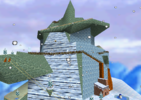
|
||
| A snow-covered mountain inhabited by penguins and snowpeople. Wooden bridges and moving gondolas are built into the side of the mountain. A cabin is near its peak. This cabin contains the Snow Slide, where Mario is challenged by a big belly-sliding penguin. Unlock criterion: collect 3 Power Stars | ||
| Bowser in the Dark World |
Missions | |
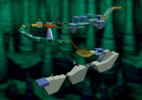
|
||
| A winding path in a cavernous void. The path bears Amps and shifting platforms. It ultimately leads to Bowser, who is fought on a circular platform surrounded by floating bombs. Unlock criterion: collect 8 Power Stars | ||
| The Princess's Secret Slide |
Missions | |
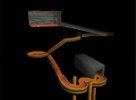
|
||
| A carpeted slide hidden on the mezzanine. Reaching the bottom of the slide gives Mario access to a Power Star - the first Secret Star available to the player. Reaching the bottom within 21 seconds awards him with a second one. Unlock criterion: collect a Power Star | ||
| The Secret Aquarium |
Missions | |
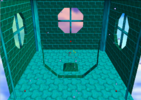
|
||
| A closed tank with small fish and Red Coins. Collecting all of them reveals a Secret Star. The aquarium is accessed through a little alcove in the same room that holds the painting for Jolly Roger Bay. Unlock criterion: collect 3 Power Stars | ||
| Tower of the Wing Cap |
Missions | |
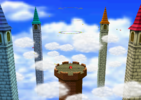
|
||
| Towers in a sea of clouds. The turret in the middle holds the Wing Cap Switch that makes the Wing Cap permanently available in normal courses once struck. Red Coins appear around the towers and can only be collected by Mario in his wing form. Unlock criterion: collect 10 Power Stars | ||
| The Castle Basement and Courtyard | ||
| 05. Big Boo's Haunt |
Missions | |
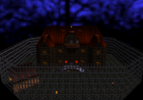
|
||
| The haunted house hidden in Princess Peach's courtyard. The rooms of the house contain ghosts and animated furniture that try to strike Mario. Navigation requires solving puzzles and memorizing patterns in the halls. Failing to do so often brings Mario to the house's flooded basement, where a spinning carousel filled with Boos can be found. Unlock criteria: clear Bowser in the Dark World, collect 12 Power Stars, and defeat the Big Boo that holds the small carousel in the courtyard | ||
| 06. Hazy Maze Cave |
Missions | |
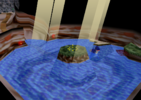
|
||
| An underground labyrinth filled with dead ends, traps, and bottomless pits. There are two floors. The first one has a large chamber in the southeast with a controllable elevator, hallways with rolling Boulders in the the northwest, and a maze with toxic clouds in the northeast. The lower floor leads to a pool that holds a friendly sea dragon. Unlock criterion: clear Bowser in the Dark World | ||
| 07. Lethal Lava Land |
Missions | |
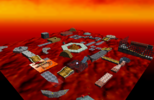
|
||
| Platforms in a lava sea. Some of them shift back and forth or can be manually rolled. They surround a small volcano that can be physically entered. Bullies appear in this course and will knock Mario into lava on contact. Sparkies and other fiery obstacles also appear that burn him when touched. Unlock criterion: clear Bowser in the Dark World | ||
| 08. Shifting Sand Land |
Missions | |
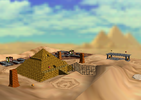
|
||
| Desert sands surrounding a pyramid. A condor flies through the sky here. Much of the course is covered in quicksand and steep dunes. Little tornados can be used to avoid obstacles. Narrow walkways are found in the northeast and a small oasis in the northwest. The pyramid can be entered, where a labyrinth leads to the boss Eyerok. Unlock criterion: clear Bowser in the Dark World | ||
| 09. Dire, Dire Docks |
Missions | |
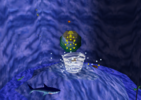
|
||
| Deep water. A whirlpool is at the center of the seabed and is circled by sharks and a manta ray. A corridor in the east leads to an wider area where Bowser has hidden a submarine. Unlock criterion: collect 30 Power Stars | ||
| Bowser in the Fire Sea |
Missions | |
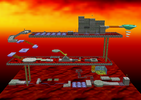
|
||
| Three narrow pathways surrounded by lava. Portions of the course gently rise and fall in lava, making traversal challenging. The pathway leads to the the second battle against Bowser. Unlock criterion: complete "Board Bowser's Sub" | ||
| Cavern of the Metal Cap |
Missions | |
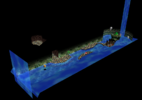
|
||
| An underground streambed that holds the Metal Cap Switch. Striking it makes the Metal Cap accessible in other courses. The water moves rapidly in this course. If Mario becomes trapped in it, he is brought to the Castle Grounds. Unlock criterion: clear Bowser in the Dark World | ||
| Vanish Cap Under the Moat |
Missions | |
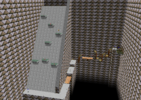
|
||
| A hidden area only accessible once the castle's moat is drained. When Mario enters the course he is in his vanish form, and he must navigate the course while the power-up is still in effect to access the Vanish Cap Switch. Striking it makes the Vanish Cap accessible in other courses. Unlock criteria: clear Bowser in the Dark World and drain the castle's moat | ||
| Upper Floors and Tower | ||
| 10. Snowman's Land |
Missions | |
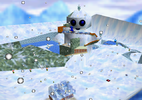
|
||
| A chilly land surrounding a giant Snowman. Slippery ice and freezing ponds occur in this course. Chill Bully occurs on a floating island of ice in the east. Narrow paths allow Mario to ascend the Snowman, but he will begin to blow gusts of air when he nears his head. An enterable igloo is near the base of the Snowman. Unlock criterion: clear Bowser in the Fire Sea | ||
| 11. Wet-Dry World |
Missions | |
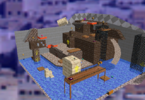
|
||
| A flooded, empty town. There are colorful switches at several locations in the town that cause the water level to rise or fall. There is a hidden Downtown area that can only be accessed through the cage in the southeast. Unlock criterion: clear Bowser in the Fire Sea | ||
| 12. Tall, Tall Mountain |
Missions | |
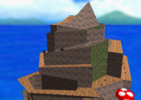
|
||
| A tall mountain surrounded by mushrooms high above the sea. Gusts of wind and the Fwoosh enemy make ascending the mountain challenging. The entrance to a secret slide can be found near the summit. Ukkikis live in this course, one of which attempts to steal Mario's cap. Unlock criterion: clear Bowser in the Fire Sea | ||
| 13. Tiny-Huge Island |
Missions | |
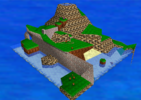
|
||
| An island that presents itself in two different ways depending on which painting it is accessed from in the castle. One is large with vast areas and giant versions of normal enemies. Mario can easily access the interior of this version of the island, which is home to Wiggler. The other is tiny with small enemies. Changing the terrain in one version of the island affects the other two and doing so is required to obtain all of its Power Stars. Unlock criterion: clear Bowser in the Fire Sea | ||
| 14. Tick Tock Clock |
Missions | |
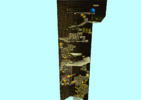
|
||
| A vertical obstacle course within the tower's clock. Moving platforms are found throughout the clockwork that can help Mario reach hidden alcoves or throw him back towards the bottom. The speed of these platforms (and whether they move at all) is determined by where the clock's hands are positioned when he enters the course. Unlock criterion: collect 50 Power Stars | ||
| 15. Rainbow Ride |
Missions | |
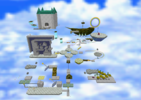
|
||
| Floating islands and moving platforms high in the sky. Magic Carpets travel along rainbows in large stretches of the course, one of which feeds through a floating palace. The Rainbow Cruiser can be found in the northeast. Unlock criterion: collect 50 Power Stars | ||
| Bowser in the Sky |
Missions | |
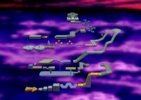
|
||
| A challenging obstacle course that leads to the final confrontation with Bowser. Some of the platforms on this course allow Mario to walk up walls if he maintains momentum while others shift under his weight. Bowser will start to break the arena he is fought on, leaving it in the shape of a five-pointed star. The reward for defeating him - the Jumbo Star - is not incorporated into Mario's total Power Star count. Unlock criterion: collect 70 Power Stars | ||
| Wing Mario Over the Rainbow |
Mission | |
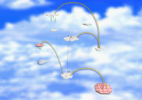
|
||
| Clouds and checkerboard platforms in the sky. The platforms are bridged by rainbows. Unlock criterion: collect 50 Power Stars | ||
| Other | ||
| Mushroom Castle |
Missions | |
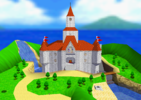
|
||
| Princess Peach's castle in the Mushroom Kingdom. Toads and Peach's pet rabbit MIPS are sealed inside the castle. Some of them will give Mario a Power Star when spoken to. Unlock criterion: begin a new save file | ||
| Level chart information and legend: The normal courses are designated with the unique number they are given in-game. Bowser and secret courses lack numerical designation and are listed in the order they present in Pelland and Owsen (1996). Three symbols convey attributes about each course: | ||
Mushroom Castle
- Offers a space for the player to familiarize themselves with controls; devs noted it was important to make Mario fun to simply move around, so having a space for the player to make their own fun was important
Notes and references
Notes
- ^ Private correspondence with shmuplations clarifies that the text they translated as "diorama" was written as 箱庭 (hakoniwa) in the original Shogakukan (1996) text.
References
- ^ a b c d Yoshiaki Koizumi. "Super Mario Galaxy: The Journey from Garden to Galaxy" (archived). Montreal International Games Summit. Jan 2007. Recorded by Eric St-Cyr. Compiled by Hover. YouTube, youtube.com. Published 24 Sep 2016. Accessed 27 Feb 2021.
- ^ a b 64編集部 (eds). スーパーマリオ64 マリオ・ザ・テクニック―完全攻略への最短ルート編 (Japanese source). Tokyo: Takarajimasha, 1996. ISBN: 978-4-79-661121-3. Cited in-text as Takarajimasha (1996).
- ^ a b c shmuplations (translator). "Super Mario 64 – 1996 Developer Interviews" (English translations of Takarajimasha and Shogakukan, 1996). shmuplations.com. Published 2022. Accessed 22 Jun 2023.
- ^ Editing staff (eds). スーパーマリオ64 (ワンダーライフスペシャル―任天堂公式ガイドブック) (Japanese source). Tokyo: Shogakukan, 1996. ISBN: 978-4-09-102554-8. Cited in-text as Shogakukan (1996).
- ^ a b c Bill Trinen. "What's in a Box?". Nintendo Treehouse Log. Tumblr, tumblr.com. Published 14 Jun 2017. Accessed 30 Jan 2021.
- ^ Andrew R. Dean. "Chapter 8: The Courtyard Garden". Handbook, Part 1: Design & Craft (digital). North American Japanese Garden Association, najga.org. Published 10 Dec 2010. Accessed 24 Jun 2023.
Image references
- ^ Mizu-chan. Miniature Japanese garden. Minato, Tokyo. 21 Jan 2014. Muza-chan's Gate to Japan, muza-chan.net.
